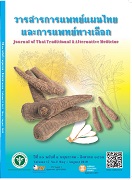The Concept of Stress Management in Thai Traditional Medicine
Main Article Content
Abstract
Currently, stress healing needs prolonged medication with harmful side effects. This research studied the concept of stress management in Thai Traditional in aspects of mechanism, disease progression of stress, healing methods, and prevention from stress consequences. The research was a qualitative research. Data was collected through a combination of searching 9 Thai Traditional Medicine scriptures and interviewing of 9 Thai Traditional Medicine practitioners. The results are the followings: Stress consequences are caused by the 4 elements, season, age, the time of day, geographical features, and behaviors. Stress will initially escalate the fire element along with the wind element and diminish the water element. If stress prolongs, it will reduce the fire element along with the wind element and augment the water element. The augmented water element will be stagnated and then bodily waste will be accumulated. The amount of waste will increase gradually until it reaches a certain point that it will be detrimental to the earth element. Various diseases will then ensue. Symptoms will begin with digestive system, and then ascend to the head. Disorder of the earth element is caused by three parts which are the heart, nutrition, and bodily waste. Stress healing in Thai Traditional Medicine concept is done by bringing these three parts back to normal, rectifying the fire and the wind element, and nurturing the earth element. Stress prevention can be done by rectifying the 4 elements regularly, avoiding risky behaviors, and being optimistic.
Article Details
References
2. Office of the National Economic and Social Development Board. Social situation and outlook: Quarter 3 of 2017. Bangkok: Office of the National Economic and Social Development Board; 2017;14(4):1-31
3. Griffin RM. 10 Health Problems Related to Stress That You Can Fix [Internet]. WebMD; 2014 [cited 2017]. Available from: https://www.webmd.com/balance/stress-management/features/10-fixable-stress-related-health-problems#1
4. BBC NEWS: Health London (England): The British Broadcasting Corporation; Brain activity 'key in stress link to heart disease'. [Internet]. 2017 Jan 12 [cited 2017 JUN 10]. Available from: https://www.bbc.com/news/health-38584975
5. WHO Geneva (Switzerland): The World Health Organization; International statistical classification of diseases and related health problems 10th Revision. [Internet]. 2016 [cited 2017 Jul 12]; [2 screens]. Available from: http://apps.who.int/classifications/icd10/browse/2016/en#/V
6. Drugs.com. Auckland (New Zealand): Diazepam. [Internet]. c1996-2018 [cited 2018 Jan 4]. Available from: https://www.drugs.com/diazepam.html
7. Pongwachararak S (interviewer). Interview of Samut Saru. 2018 Jun 25; Roi Et: 2018.
8. Pongwachararak S (interviewer). Interview of Tongsa Jaroenta. 2018 Jun 26; Roi Et: 2018.
9. Pongwachararak S (interviewer). Interview of Prasart Tesyam. 2018 Jun 28; Lopburi: 2018.
10. Pongwachararak S (interviewer). Interview of Kitti KittiJaruwong. 2018 Jun 29; Chiang Mai: 2018.
11. Pongwachararak S (interviewer). Interview of Prasrat Sawatampairak. 2018 Jun 30; Nonthaburi: 2018.
12. Pongwachararak S (interviewer). Interview of Komon Cha-em. 2018 Jun 30; Pathum Thani: 2018.
13. Pongwachararak S (interviewer). Interview Napat Panichakarn. 2018 Jun 30; Pathum Thani: 2018.
14. Pongwachararak S (interviewer). Interview of Komson Dinakara na ayudhaya. 2018 Jun 24; Bangkok: 2018.
15. Pongwachararak S (interviewer). Interview of Pumipat Wechapuek. 2018 Jul 1; Nonthaburi: 2018.
16. Thai Traditional Medical School, Wat Phra Chetuphon Vimolmangklararm Rajwaramahaviharn. Phaetsart Songkroh Volume 3. Bangkok: 119 p. (in Thai)
17. Foundation of Thai Traditional Medicine and the Ayurved Thamrong School, Center of Applied Thai Traditional Medicine , the Faculty of MedicineSiriraj Hospital Mahidol University. Thai Traditional Medicine Textbook (Phaetsart Songkroh Original Edition) Volume 1. Bangkok: Supawanich Printing; 2007. 458 p. (in Thai)
18. Thai Traditional Medical School, Wat Phra Chetuphon Vimolmangklararm Rajwaramahaviharn. Phaetsart Songkroh Volume 2. Bangkok: 242 p. (in Thai)
19. The Association of Thai Traditional Healers (Chiang Mai). Chantawatapatisonti Scripture. 40 p. (in Thai)
20. Dinakara na ayudhaya K. Basic principle of Thai traditional medicine. 319 p. (in Thai)
21. Somsiri N. The result of applying The Royal Thai Massage for alleviating headache from stress [cited 2018 Jan 4]. Available from: http://www.ssko.moph.go.th/ttm/?name=research&file=readresearch&id=5 (in Thai)
22. Vimuktalop P. The effect of foot reflexology on stress and blood pressure in essential hypertensive patients (thesis). Master of Nursing Science. Adult Nursing Program, Faculty of Nursing. Nakhonpathom: Mahidol University; 2008. (173 p.) (in Thai)


